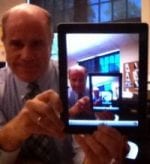When I first arrived at Hackley School, as a math teacher in 1988, the computer labs were for math teachers. The two labs were maintained by the Math Department and 18 IBM (remember IBM PCs?) PC XT’s and 18 IBM PS/2 , no hard drives, and only floppy disk drives. We provided the floppy disk for the operating system and students brought their own data disks. (5 ¼” for the XT’s and 3 ½” for the PS/2). Math faculty used programs such as Green Globs and Graphing Equations and Geometric Supposer. Our three level Computer Science curriculum were also part of the mathematics department.
At the time Hackley’s stated philosophy included, “Hackley exposes its students to classic texts and traditional disciplines, maintains an informed skepticism of fads and innovations….” In the years since, we have removed those words from the philosophy statement, not because we ceased to be healthy skeptics of educational fads but because it led those reading the statement to believe that we were “educational traditionalists” and therefore change averse.
[slideshow id=1]
If the past twenty five years of Hackley’s history have proven anything, it is that Hackley is not change averse, but embracing of change that improves the lives of students and their educational experience. Beyond the obvious changes to physical plant, Hackley has evolved and expanded its curriculum in numerous ways, from the 9th Grade Physics curriculum in Science to the dramatic expansion of Visual Arts to the addition of Electronic Publishing and Chinese Language studies. Beyond dramatic visual changes in technology on campus from computer labs only to the additional presence of classroom laptops/iPads, projectors and Smart Boards, the most significant change exists in the way teachers and students use technology in curriculum, often in ways not immediately visible but that have tremendous impact on the way we teach and learn. (Technology on the Hilltop: Expanding Classrooms with Digital Engagement)
However, during those 25 years, one thing has not changed: the central function of the Hackley classroom is dialogue and intellectual exchange. Hackley faculty continue to create an environment where they can teach students the critical thinking skills to tackle new challenges. While technology allows for reconsideration of method, it does not change the substance of the Hackley classroom. Most importantly, while technology has provided new forms of interaction, it has not changed the relationship between Hackley teacher and student.
We see the questions this embrace of change sometimes provokes as a welcome challenge. As more and more students and faculty make use of the available technology on campus, our current methods of technology tool delivery are maxing out. Demand for use of computer labs and laptop/iPad carts now creates some competition for these resources, which sometimes requires faculty to rework lessons plans to accommodate availability. Even when not competing for resources, teachers often lose valuable time to the effort to distribute and deploy devices from a portable cart. All in all, as we examine the thoughtful ways faculty use these resources we continue to discover the ways current tools fall short of their purpose.
Such dilemmas beg the question “What if all students had their own technology”? Now that upper school students are able to connect their own computers, smartphones and/or tablets to our wireless network, faculty often ask students to make use of their personal devices in the classroom. However, inconsistent student ownership and a large variety of student owned tools, makes this approach impractical. This naturally leads to the question, “What if everyone was asked to bring a specific technology device to school?”
Over the past several months Erich Tusch, our Director of Instructional Technology, and I have been discussing this question with our student/faculty Technology Advisory Committee, our Academic Committee and through a series of working upper school faculty lunches. Many of the this summer’s professional development workshops Mr. Tusch organized dealt with using a device in the classroom our November professional development day will include more investigation of this idea. We plan to introduce the topic and report on our discussions at the October 16 HPA Coffee. Please join us to participate in the conversation and/or comment on this Perspectives story.

Well written article, Jed. I am amazed each day as I see how not only teachers are implementing tech into their teaching delivery, but when I hear directly from children in how they can use tech resources to demonstrate their understanding of classroom topics and curriculum. This is one area that seems to evolve so much faster than others in our practicing pedagogy in teaching- and it is so important that we have the opportunity to discuss the ever changing technology world!